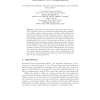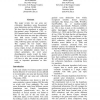250 search results - page 8 / 50 » Learning Probabilistic Models of Word Sense Disambiguation |
127
click to vote
NLDB
2005
Springer
15 years 7 months ago
2005
Springer
Abstract. Automated Text Categorization has reached the levels of accuracy of human experts. Provided that enough training data is available, it is possible to learn accurate autom...
98
Voted
CORR
2000
Springer
15 years 1 months ago
2000
Springer
This paper revisits the one sense per collocation hypothesis using fine-grained sense distinctions and two different corpora. We show that the hypothesis is weaker for fine-graine...
116
Voted
ACL
1996
15 years 3 months ago
1996
In this paper, we present a new approach for word sense disambiguation (WSD) using an exemplar-based learning algorithm. This approach integrates a diverse set of knowledge source...
124
click to vote
ACL
2003
15 years 3 months ago
2003
A central problem of word sense disambiguation (WSD) is the lack of manually sense-tagged data required for supervised learning. In this paper, we evaluate an approach to automati...
116
Voted
FGCN
2008
IEEE
15 years 8 months ago
2008
IEEE
Word sense disambiguation has always been a key problem in Natural Language Processing. In the paper, we use the method of Information Gain to calculate the weight of different po...


